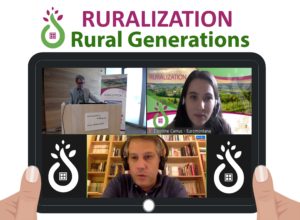How to encourage generation renewal, young people to stay, newcomers to settle? Which barriers do they face and how policies can help to overcome them? These were the questions raised during the conference of the Horizon 2020 project Ruralization on 8th and 9th November 2021, where Blandine Camus, Communication and Policy Officer, was invited to share Euromontana’s thoughts on the topic.
Regional initiatives towards potential young newcomers
Blandine Camus shared with participants the main results of Euromontana’s European mountain youth survey, which shows that lack of skilled and diversified employment, insufficient public transport offer and difficult access to housing are hindering the arrival of young newcomers in mountain areas.
Many initiatives already exist in rural and mountainous areas to strengthen territorial attractiveness towards younger generations, such as:
- Territorial marketing strategies, which can help to build regions’ image and change people mindset on rural mountainous areas, as demonstrated by the PADIMA project.
- Awareness raising campaigns towards young people to show them the tools and funds they can benefit from through European rural development funds to build their projects and create businesses in rural areas, as done in 3 mountainous regions in Poland in 2018.
- Short-term professional experiences in rural and mountainous territories, like the “rural Erasmus” and the ODISSEU programme for rural internships in Spain or the rural civic service in France. Such initiatives provide an opportunity for young people to undertake an internship in a rural area and to be part of the community. These approaches have shown that the experience can help young people to project themselves into a rural area, find skilled employment and see the benefits in terms of quality of life.
Yet, more efforts should be done at local and regional levels to create jobs, as well as to increase the access to basic services such as transport and housing in order to make mountain territories more attractive for newcomers, in particular for young people.
How can the Long-Term Vision for Rural Areas support ruralisation?
 Discussions during the conference mentioned that a ruralisation trend might be triggered both by the COVID-19 crisis and by the development of remote working. The Euromontana’s upcoming report underlines some young people were influenced by the sanitary crisis in their desire to settle in the mountains, said Blandine Camus. This appetite of younger generations to do remote working in mountain areas call upon regions to do more efforts to facilitate this practice for instance by offering equipped co-working spaces. However, she also stressed that teleworking does not apply to all jobs and therefore rural areas cannot count only on this to impulse rural repopulation.
Discussions during the conference mentioned that a ruralisation trend might be triggered both by the COVID-19 crisis and by the development of remote working. The Euromontana’s upcoming report underlines some young people were influenced by the sanitary crisis in their desire to settle in the mountains, said Blandine Camus. This appetite of younger generations to do remote working in mountain areas call upon regions to do more efforts to facilitate this practice for instance by offering equipped co-working spaces. However, she also stressed that teleworking does not apply to all jobs and therefore rural areas cannot count only on this to impulse rural repopulation.
Moreover, it remains unclear whether this repopulation trend will take place and stay in the long-term and which territories will benefit from this influx of new residents; therefore, these demographic trends must be assessed and analysed. In this regard, Blandine Camus called on the European Commission to make use of the European Rural Observatory, which creation was announced in the Long-Term Vision for Rural Areas for 2022. The observatory should provide updated data and analysis of rural repopulation trends to enable the understanding of the factors that may lead to incoming migration in certain rural, mountainous, and remote areas.
15 November 2021









